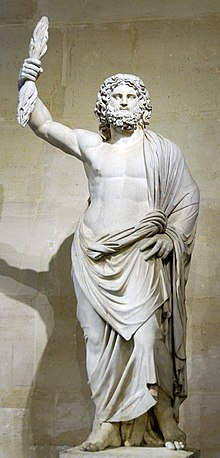ZEUS GOD ALMIGHTY

ZEUS
Zeus[a] is the sky and thunder god in ancient Greek religion, who rules as king of the gods of Mount Olympus. His name is cognate with the first element of his Roman equivalent Jupiter. His mythologies and powers are similar, though not identical, to those of Indo-European deities such as Jupiter, Perkūnas, Perun, Indra, Dyaus and Thor.[6][7][8][9]
Zeus is the child of Cronus and Rhea, the youngest of his siblings to be born, though sometimes reckoned the eldest as the others required disgorging from Cronus's stomach. In most traditions, he is married to Hera, by whom he is usually said to have fathered Ares, Hebe, and Hephaestus.[10] At the oracle of Dodona, his consort was said to be Dione, by whom the Iliad states that he fathered Aphrodite.[13] Zeus was also infamous for his erotic escapades. These resulted in many divine and heroic offspring, including Athena, Apollo, Artemis, Hermes, Persephone, Dionysus, Perseus, Heracles, Helen of Troy, Minos, and the Muses.[10]
He was respected as an allfather who was chief of the gods[14] and assigned roles to the others:[15] "Even the gods who are not his natural children address him as Father, and all the gods rise in his presence."[16][17] He was equated with many foreign weather gods, permitting Pausanias to observe "That Zeus is king in heaven is a saying common to all men".[18] Zeus' symbols are the thunderbolt, eagle, bull, and oak. In addition to his Indo-European inheritance, the classical "cloud-gatherer" (Greek: Νεφεληγερέτα, Nephelēgereta)[19] also derives certain iconographic traits from the cultures of the ancient Near East, such as the scepter. Zeus is frequently depicted by Greek artists in one of two poses: standing, striding forward with a thunderbolt leveled in his raised right hand, or seated in majesty.
Family
Zeus and Hera
Main article: Hera
Zeus was brother and consort of Hera. By Hera, Zeus sired Ares, Hebe and Hephaestus, though some accounts say that Hera produced these offspring alone. Some also include Eileithyia, Eris, Enyo and Angelos as their daughters. In the section of the Iliad known to scholars as the Deception of Zeus, the two of them are described as having begun their sexual relationship without their parents knowing about it.[37] The conquests of Zeus among nymphs and the mythic mortal progenitors of Hellenic dynasties are famous. Olympian mythography even credits him with unions with Leto, Demeter, Metis, Themis, Eurynome and Mnemosyne.[38][39] Other relationships with immortals included Dione and Maia. Among mortals were Semele, Io, Europa and Leda (for more details, see below) and with the young Ganymede (although he was mortal Zeus granted him eternal youth and immortality).
Many myths render Hera as jealous of his amorous conquests and a consistent enemy of Zeus' mistresses and their children by him. For a time, a nymph named Echo had the job of distracting Hera from his affairs by talking incessantly, and when Hera discovered the deception, she cursed Echo to repeat the words of others.
Transformation of Zeus
Love interest Disguises
Oracles of Zeus
Although most oracle sites were usually dedicated to Apollo, the heroes, or various goddesses like Themis, a few oracular sites were dedicated to Zeus. In addition, some foreign oracles, such as Baʿal's at Heliopolis, were associated with Zeus in Greek or Jupiter in Latin.
The Oracle at Dodona
The cult of Zeus at Dodona in Epirus, where there is evidence of religious activity from the second millennium BC onward, centered on a sacred oak. When the Odyssey was composed (circa 750 BC), divination was done there by barefoot priests called Selloi, who lay on the ground and observed the rustling of the leaves and branches.[115] By the time Herodotus wrote about Dodona, female priestesses called peleiades ("doves") had replaced the male priests.
Zeus' consort at Dodona was not Hera, but the goddess Dione — whose name is a feminine form of "Zeus". Her status as a titaness suggests to some that she may have been a more powerful pre-Hellenic deity, and perhaps the original occupant of the oracle.
The Oracle at Siwa
The oracle of Ammon at the Siwa Oasis in the Western Desert of Egypt did not lie within the bounds of the Greek world before Alexander's day, but it already loomed large in the Greek mind during the archaic era: Herodotus mentions consultations with Zeus Ammon in his account of the Persian War. Zeus Ammon was especially favored at Sparta, where a temple to him existed by the time of the Peloponnesian War.[116]
Roles and epithets
See also: Category:Epithets of Zeus

Roman marble colossal head of Zeus, 2nd century AD (British Museum)[80]
Zeus played a dominant role, presiding over the Greek Olympian pantheon. He fathered many of the heroes and was featured in many of their local cults. Though the Homeric "cloud collector" was the god of the sky and thunder like his Near-Eastern counterparts, he was also the supreme cultural artifact; in some senses, he was the embodiment of Greek religious beliefs and the archetypal Greek deity.
Aside from local epithets that simply designated the deity as doing something random at some particular place, the epithets or titles applied to Zeus emphasized different aspects of his wide-ranging authority:

A bust of Zeus.
Additional names and epithets for Zeus are also:
Zeus[a] is the sky and thunder god in ancient Greek religion, who rules as king of the gods of Mount Olympus. His name is cognate with the first element of his Roman equivalent Jupiter. His mythologies and powers are similar, though not identical, to those of Indo-European deities such as Jupiter, Perkūnas, Perun, Indra, Dyaus and Thor.[6][7][8][9]
Zeus is the child of Cronus and Rhea, the youngest of his siblings to be born, though sometimes reckoned the eldest as the others required disgorging from Cronus's stomach. In most traditions, he is married to Hera, by whom he is usually said to have fathered Ares, Hebe, and Hephaestus.[10] At the oracle of Dodona, his consort was said to be Dione, by whom the Iliad states that he fathered Aphrodite.[13] Zeus was also infamous for his erotic escapades. These resulted in many divine and heroic offspring, including Athena, Apollo, Artemis, Hermes, Persephone, Dionysus, Perseus, Heracles, Helen of Troy, Minos, and the Muses.[10]
He was respected as an allfather who was chief of the gods[14] and assigned roles to the others:[15] "Even the gods who are not his natural children address him as Father, and all the gods rise in his presence."[16][17] He was equated with many foreign weather gods, permitting Pausanias to observe "That Zeus is king in heaven is a saying common to all men".[18] Zeus' symbols are the thunderbolt, eagle, bull, and oak. In addition to his Indo-European inheritance, the classical "cloud-gatherer" (Greek: Νεφεληγερέτα, Nephelēgereta)[19] also derives certain iconographic traits from the cultures of the ancient Near East, such as the scepter. Zeus is frequently depicted by Greek artists in one of two poses: standing, striding forward with a thunderbolt leveled in his raised right hand, or seated in majesty.
| King of the Gods God of the sky, lightning, thunder, law, order, justice | |
 ] ] | |
| Mount Olympus | |
| Thunderbolt, eagle, bull, oak | |
| Thursday | |
Family
Zeus and Hera
Main article: Hera
Zeus was brother and consort of Hera. By Hera, Zeus sired Ares, Hebe and Hephaestus, though some accounts say that Hera produced these offspring alone. Some also include Eileithyia, Eris, Enyo and Angelos as their daughters. In the section of the Iliad known to scholars as the Deception of Zeus, the two of them are described as having begun their sexual relationship without their parents knowing about it.[37] The conquests of Zeus among nymphs and the mythic mortal progenitors of Hellenic dynasties are famous. Olympian mythography even credits him with unions with Leto, Demeter, Metis, Themis, Eurynome and Mnemosyne.[38][39] Other relationships with immortals included Dione and Maia. Among mortals were Semele, Io, Europa and Leda (for more details, see below) and with the young Ganymede (although he was mortal Zeus granted him eternal youth and immortality).
Many myths render Hera as jealous of his amorous conquests and a consistent enemy of Zeus' mistresses and their children by him. For a time, a nymph named Echo had the job of distracting Hera from his affairs by talking incessantly, and when Hera discovered the deception, she cursed Echo to repeat the words of others.
Transformation of Zeus
Love interest Disguises
| Aegina | an eagle or a flame of fire |
| Alcmene | Amphitryon |
| Antiope | a satyr |
| Asopis | a flame of fire |
| Callisto | Artemis |
| Cassiopeia | Phoenix |
| Danae | shower of gold |
| Europa | a bull |
| Eurymedusa | ant |
| Ganymede | an eagle |
| Imandra | a shower |
| Lamia | a lapwing |
| Leda | a swan and a star |
| Manthea | a bear |
| Mnemosyne | a shepherd |
| Nemesis | a goose |
| Persephone | a serpent |
| Semele | a fire |
| Thalia | a vulture |
Although most oracle sites were usually dedicated to Apollo, the heroes, or various goddesses like Themis, a few oracular sites were dedicated to Zeus. In addition, some foreign oracles, such as Baʿal's at Heliopolis, were associated with Zeus in Greek or Jupiter in Latin.
The Oracle at Dodona
The cult of Zeus at Dodona in Epirus, where there is evidence of religious activity from the second millennium BC onward, centered on a sacred oak. When the Odyssey was composed (circa 750 BC), divination was done there by barefoot priests called Selloi, who lay on the ground and observed the rustling of the leaves and branches.[115] By the time Herodotus wrote about Dodona, female priestesses called peleiades ("doves") had replaced the male priests.
Zeus' consort at Dodona was not Hera, but the goddess Dione — whose name is a feminine form of "Zeus". Her status as a titaness suggests to some that she may have been a more powerful pre-Hellenic deity, and perhaps the original occupant of the oracle.
The Oracle at Siwa
The oracle of Ammon at the Siwa Oasis in the Western Desert of Egypt did not lie within the bounds of the Greek world before Alexander's day, but it already loomed large in the Greek mind during the archaic era: Herodotus mentions consultations with Zeus Ammon in his account of the Persian War. Zeus Ammon was especially favored at Sparta, where a temple to him existed by the time of the Peloponnesian War.[116]
Roles and epithets
See also: Category:Epithets of Zeus

Roman marble colossal head of Zeus, 2nd century AD (British Museum)[80]
Zeus played a dominant role, presiding over the Greek Olympian pantheon. He fathered many of the heroes and was featured in many of their local cults. Though the Homeric "cloud collector" was the god of the sky and thunder like his Near-Eastern counterparts, he was also the supreme cultural artifact; in some senses, he was the embodiment of Greek religious beliefs and the archetypal Greek deity.
Aside from local epithets that simply designated the deity as doing something random at some particular place, the epithets or titles applied to Zeus emphasized different aspects of his wide-ranging authority:
- Zeus Aegiduchos or Aegiochos: Usually taken as Zeus as the bearer of the Aegis, the divine shield with the head of Medusa across it,[81][82][83] although others derive it from "goat" (αἴξ) and okhē (οχή) in reference to Zeus' nurse, the divine goat Amalthea.[84][85]
- Zeus Agoraeus: Zeus as patron of the marketplace (agora) and punisher of dishonest traders.
- Zeus Areius: either "warlike" or "the atoning one".
- Zeus Horkios: Zeus as keeper of oaths. Exposed liars were made to dedicate a votive statue to Zeus, often at the sanctuary at Olympia
- Zeus Olympios: Zeus as king of the gods and patron of the Panhellenic Games at Olympia
- Zeus Panhellenios ("Zeus of All the Greeks"): worshipped at Aeacus's temple on Aegina
- Zeus Xenios, Philoxenon, or Hospites: Zeus as the patron of hospitality (xenia) and guests, avenger of wrongs done to strangers

A bust of Zeus.
Additional names and epithets for Zeus are also:
- Abrettenus (Ἀβρεττηνός) or Abretanus: surname of Zeus in Mysia[86]
- Achad: one of his names in Syria.
- Acraeus: his name at Smyrna.
- Acrettenus: his name in Mysia.
- Adad: one of his names in Syria.
- Adultus: from his being invoked by adults, on their marriage.
- Apemius: Zeus as the averter of ills
- Apomyius Zeus as one who dispels flies
- Astrapios ("Lightninger"): Zeus as a weather god
- Bottiaeus: Worshipped at Antioch[87]
- Brontios ("Thunderer"): Zeus as a weather god
- Diktaios: Zeus as lord of the Dikte mountain range, worshipped from Mycenaean times on Crete[88]
- Ithomatas: Worshipped at Mount Ithome in Messenia
- Zeus Adados: A Hellenization of the Canaanite Hadad and Assyrian Adad, particularly his solar cult at Heliopolis[89]
- Zeus Bouleus: Worshipped at Dodona, the earliest oracle, along with Zeus Naos
- Zeus Georgos (Ζεὺς Γεωργός, "Zeus the Farmer"): Zeus as god of crops and the harvest, worshipped in Athens
- Zeus Helioupolites ("Heliopolite" or "Heliopolitan Zeus"): A Hellenization of the Canaanite Baʿal (probably Hadad) worshipped as a sun god at Heliopolis (modern Baalbek)[89]
- Zeus Kasios ("Zeus of Mount Kasios" the modern Jebel Aqra): Worshipped at a site on the Syrian–Turkish border, a Hellenization of the Canaanite mountain and weather god Baal Zephon
- Zeus Labrandos ("Zeus of Labraunda"): Worshiped at Caria, depicted with a double-edged axe (labrys), a Hellenization of the Hurrian weather god Teshub
- Zeus Meilichios ("Zeus the Easily-Entreated"): Worshipped at Athens, a form of the archaic chthonic daimon Meilichios
- Zeus Naos: Worshipped at Dodona, the earliest oracle, along with Zeus Bouleus
- Zeus Tallaios ("Solar Zeus"): Worshipped on Crete
- Hetareios (Ἑταιρεῖος, "of fellowship"). According to the Suda, Zeus was called this among the Cretans.[90]
- Eleutherios (Ἐλευθέριος, "of freedom"). At Athens after the Battle of Plataea, Athenians built the Stoa of Zeus Eleutherios.[91] Some writers said that was called "of freedom" because free men built the portico near his shrine, while others because Athenians escaped subjection to the power of Persia and they were free.[92]
- Bottiaios (Βοττιαίος, "of the Bottiaei"). Libanius wrote that Alexander the Great founded the temple of Zeus Bottiaios, in the place where later the city of Antioch was built.[93][94]
- Ourios (Οὐριος, "of favourable wind"). Ancient writers wrote about a sanctuary at the opening of the Black Sea dedicated to the Zeus Ourios (ἱερὸν τοῦ Διὸς τοῦ Οὐρίου).[95] In addition, on the island of Delos a dedication to Zeus Ourios was found. The dedication was made by a citizen of Ascalon, named Damon son of Demetrius, who escaped from pirates.[96]



